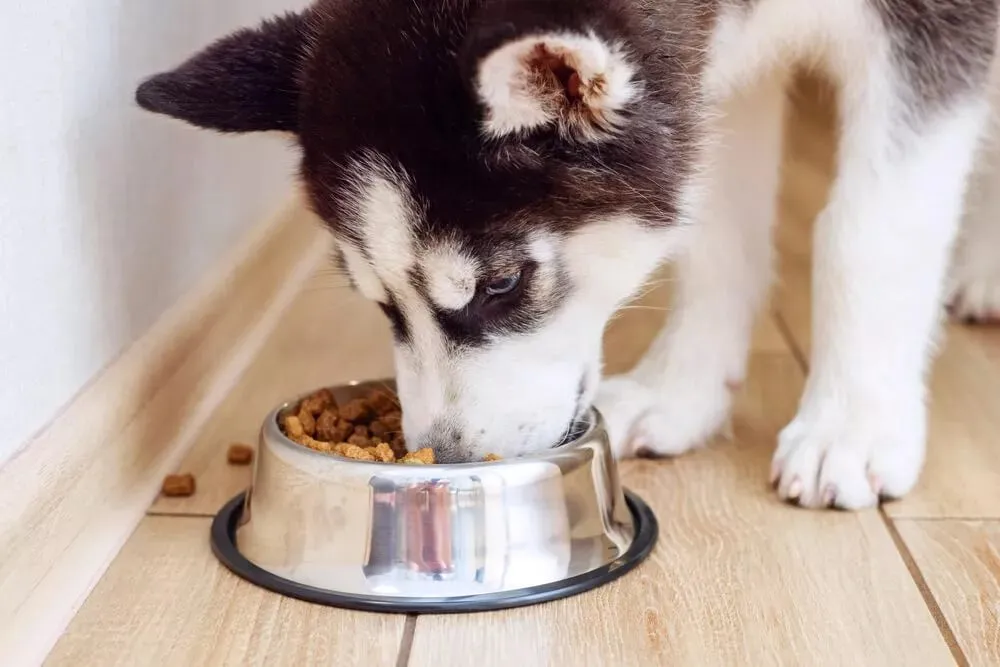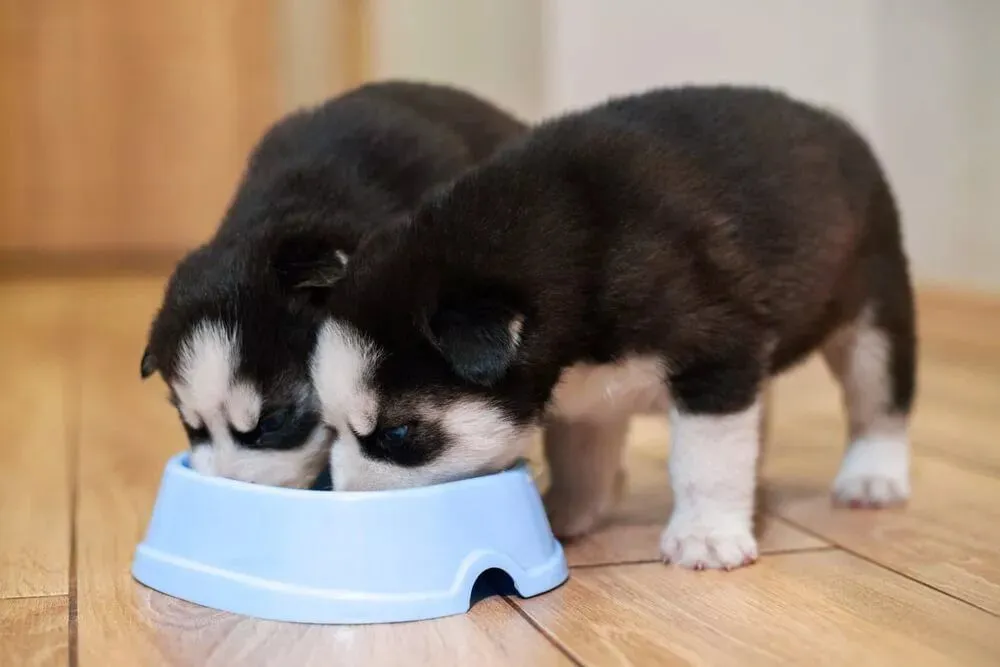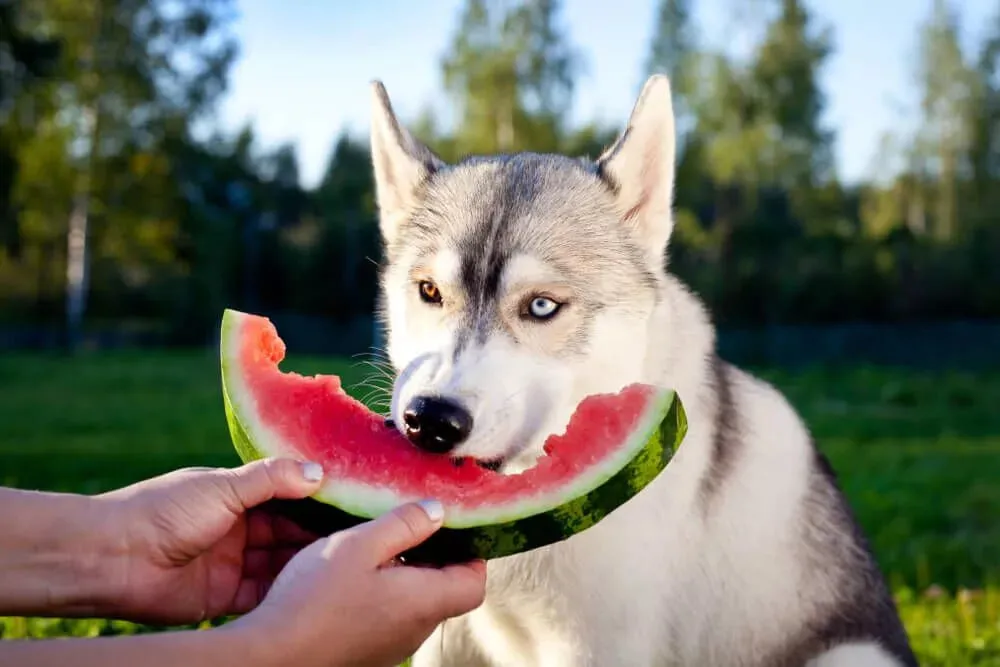Huskies are renowned for their intelligence, playful nature, and adventurous spirit. These dogs, known for their strength, speed, and incredible stamina, require a specific diet to maintain their energy levels and overall health. As a Husky owner, understanding their nutritional needs beyond commercial dog food is crucial to ensuring a balanced and fulfilling diet. This guide will explore what Huskies eat in the wild, their essential dietary requirements, safe human foods, and what to avoid to keep your beloved companion thriving.
What Do Wild Siberian Huskies Eat?
Originating in Siberia, the Husky breed has a long history, domesticated over 4,000 years ago by the indigenous Chukchi people for pulling sleighs and guarding land. In their wild habitat, Huskies are opportunistic feeders, consuming whatever is available. This includes anything from scraps and garbage to actively hunting small prey. Their strong prey drive means they will readily hunt, kill, and consume small wildlife. Furthermore, their diet in the wild often includes vegetation and wild fruits, as well as the contents of herbivore stomachs (such as rodents and rabbits), providing essential fiber and dietary variety. However, it’s important to remember that the dietary needs of a Husky living as a family pet differ significantly from those in the harsh, cold climates of Siberia or Antarctica. Pet Huskies are typically less active and require fewer calories for warmth.
 A majestic Siberian Husky with striking blue eyes sitting calmly outdoors, looking attentive.
A majestic Siberian Husky with striking blue eyes sitting calmly outdoors, looking attentive.
While Huskies are a large, active breed, they generally require a relatively smaller amount of food compared to other dogs of a similar size. The exact quantity depends on their individual size, age, and activity levels. Regular exercise is paramount for any Husky, as they naturally possess a slow metabolism, and burning energy effectively stimulates their appetite. A well-balanced diet is key to supporting their unique physiological needs.
Understanding Your Husky’s Dietary Needs
For a Husky living in a domestic environment, a well-balanced and nutritionally complete diet is paramount. This can come from various sources, including high-quality commercial wet and dry foods, home-cooked meals, or raw diets. Regardless of the chosen feeding option, several key components are essential for your Husky’s health and vitality.
Protein: The Building Block
Huskies thrive on a high-protein diet, predominantly sourced from meat. Protein is indispensable for maintaining a healthy coat and skin, supporting robust muscle development, facilitating tissue repair, and serving as a vital energy source. Excellent protein sources include lean meats like chicken, beef, turkey, lamb, and duck, as well as various types of fish. Organ meats and animal by-products such as heart, liver, kidneys, and lungs are also highly nutritious. Some plant-based options like soybeans can also contribute to their protein intake. Ensuring adequate protein is fundamental for their active lifestyle.
 Various raw cuts of meat, including steak and chicken, arranged on a dark surface, symbolizing protein sources for dogs.
Various raw cuts of meat, including steak and chicken, arranged on a dark surface, symbolizing protein sources for dogs.
The quality and digestibility of protein sources directly impact your Husky’s ability to utilize these essential nutrients. Opting for whole, identifiable meat sources over generic “meat by-products” on ingredient lists can often be beneficial. Always discuss dietary choices with your veterinarian, especially when considering significant changes or specialized diets like raw feeding.
Healthy Fats: Fueling Their Energy
Fats and oils are an indispensable part of a balanced diet for dogs, serving as a concentrated form of energy. They provide more than double the energy of carbohydrates and proteins, which is crucial for maintaining a Husky’s boundless energy. Fats are also vital for supporting cell, nerve, muscle, and tissue health, and they aid in the absorption of fat-soluble vitamins (A, D, E, and K). Essential fatty acids, such as omega-3 and omega-6, cannot be produced by a dog’s body and must be obtained through their diet. Common sources of omega-3 include fish oils (herring, salmon), flaxseed, and canola oils, while omega-6 can be found in pork fat, chicken fat, sunflower, and other vegetable oils.
Carbohydrates: Energy Boost
Carbohydrates, derived from sources like grains, potatoes, tapioca, and legumes, provide a valuable energy source for dogs. Generally, these are safe for Huskies unless they have a known dietary intolerance. While dogs are primarily carnivorous and can derive most of their energy from proteins and fats, carbohydrates can be an excellent way to provide an additional energy boost to their diet, particularly for highly active individuals. When choosing carbohydrate sources, opt for whole grains and complex carbohydrates that offer sustained energy release and additional nutrients.
Fruits and Vegetables: Essential Fiber and Nutrients
Fruits and vegetables are an excellent source of dietary fiber, which is crucial for maintaining a healthy gastrointestinal system in dogs. Foods rich in fiber can help prevent common issues such as diabetes, obesity, constipation, and colitis. Beyond fiber, fruits and vegetables are packed with essential vitamins and minerals that contribute to your Husky’s overall fitness and health. Integrating these into their diet provides beneficial antioxidants and phytonutrients.
 A vibrant assortment of fresh fruits and vegetables, including apples, carrots, bell peppers, and berries, suitable for canine consumption.
A vibrant assortment of fresh fruits and vegetables, including apples, carrots, bell peppers, and berries, suitable for canine consumption.
Introducing new fruits or vegetables should be done gradually and in moderation to observe your Husky’s reaction. Always wash produce thoroughly and remove any seeds, pits, or stems that could be choking hazards or contain toxic compounds. For example, apple cores and seeds contain cyanide and should always be removed before feeding.
Beyond Commercial Dog Food: Safe & Nutritious Alternatives
When considering What Do Huskies Eat Besides Dog Food, many owners look to supplement their pet’s diet with fresh, wholesome additions. Huskies are generally unfussy eaters and do not typically suffer from specific breed-related dietary intolerances, making them relatively easy to feed. However, while supplementing their diet with home-cooked or human foods can add variety and nutrition, a complete home-cooked diet created without veterinary guidance is generally not recommended, as it can be challenging to ensure it contains all the necessary nutrients your canine friend needs.
Safe and beneficial human foods that can supplement your Husky’s diet include:
- Fresh Meats: Cooked, unseasoned chicken, beef, lamb, or fish are excellent sources of high-quality protein. These can also serve as high-value training treats. Always ensure bones are removed if feeding cooked meat, as cooked bones can splinter and cause internal damage.
- Vegetables: Broccoli, carrots, asparagus, green beans, and bell peppers (in moderation) can be safely added. They provide fiber, vitamins, and minerals.
- Fruits: Bananas, blueberries, apples (without core and seeds), blackberries, and apricots (pitted) offer essential vitamins and a sweet treat.
- Plain Greek Yogurt: A small amount of plain, unsweetened Greek yogurt can provide probiotics for gut health.
- Cooked Eggs: Scrambled or boiled eggs are a fantastic source of protein.
- Rice/Oatmeal: Plain, cooked white or brown rice and oatmeal (unsweetened) can be good sources of carbohydrates, especially for Huskies with sensitive stomachs.
Remember that any supplements should be given in moderation and should not make up the bulk of their diet. Your Husky’s nutritional needs will naturally evolve with their activity levels, age, and life stage, meaning dietary adjustments may be necessary throughout their life. Always consult your veterinarian before making significant changes to their diet to ensure all nutritional requirements are met.
Foods Huskies Should Never Eat
Certain foods are potentially toxic to all dogs and must always be avoided when planning your Husky’s diet. These include:
- Grapes, Raisins, and Prunes: These can cause acute kidney failure.
- Chocolate: Contains theobromine, which is toxic to dogs, even in small amounts.
- Coffee: Contains caffeine, similar to chocolate, which is dangerous for dogs.
- Avocado: Contains persin, which can cause vomiting and diarrhea in some dogs.
- Onions, Garlic, Chives, and Leeks: These can damage red blood cells and lead to anemia.
- Citrus Fruits: While not highly toxic, the acids can cause stomach upset.
- Stone Fruits (Cherries, Peaches, Plums): The pits contain cyanide and are choking hazards.
- Xylitol: An artificial sweetener found in many sugar-free products (gum, candies, peanut butter) that is highly toxic and can cause a rapid release of insulin, leading to hypoglycemia and liver failure.
Always keep these items out of your Husky’s reach to prevent accidental ingestion.
Common Husky Eating Behaviors
Huskies can exhibit some peculiar eating habits that often raise questions for owners. Understanding these behaviors can help you address them appropriately.
Why Do Huskies Eat Their Own Fur?
There are several reasons why your dog may eat their fur. If you are unsure of the reasons or are concerned your dog is excessively grooming, consult with your veterinarian. Itchy skin diseases, such as allergies or parasitic infestations, can cause excessive grooming, leading your dog to chew and eat their fur. Additionally, behavioral issues like boredom, frustration, or separation anxiety can also manifest as over-grooming. While it is normal for dogs to lick themselves clean and ingest some fur, excessive grooming or persistent biting and chewing at their fur is not normal and warrants investigation.
Why Do Huskies Eat Grass?
Eating grass is an instinctive behavior observed in many canids, including wild dogs and wolf ancestors. Dogs often seek roughage in their diets, and grass serves as a good source of fiber. It aids digestion and can help them pass stools. While occasionally eating grass is usually harmless, if your Husky frequently eats grass and then vomits, it could be a sign of an upset stomach or an underlying digestive issue, in which case veterinary advice should be sought.
Why Do Huskies Eat Their Own Poop?
The scientific term for this less-than-savory habit is coprophagia. It is a common, though undesirable, trait in canine friends and can be either a normal behavior or a sign of an underlying illness. It can be a learned behavior, often repeated to gain attention, or it might indicate that they are trying to gain nutritional value from undigested matter in their stools. If coprophagia is new behavior and your dog is also showing signs of illness such as weight loss, vomiting, diarrhea, or a reduced appetite, then it is crucial to seek veterinary advice. Your vet can rule out medical causes and suggest behavioral interventions if needed.
Conclusion
Providing a balanced and nutritious diet is fundamental to the health and happiness of your Husky. While commercial dog foods form the foundation for many, understanding what Huskies can eat besides dog food allows for safe and enriching dietary additions. Prioritizing high-quality protein, healthy fats, and a mindful inclusion of carbohydrates, fruits, and vegetables will support their active lifestyle and overall well-being. Always be vigilant about foods that are toxic to dogs and consult with your veterinarian for personalized dietary advice, especially as your Husky’s needs evolve. By offering a well-rounded diet and monitoring their unique eating behaviors, you ensure your loyal companion remains healthy, energetic, and a cherished part of your family for years to come.
